- Home
- Lucius Shepard
Softspoken Page 2
Softspoken Read online
Page 2
…I been wanting…I been waiting…
Anxiety bristles up in her, but she also feels a mild burst of affection for the voice, and she thinks she detects a faint vibe of devotion, as if it’s been waiting inside to squeeze out the cracked door, nearly tripping her up, and rub against her ankles.
THREE
Will’s room on the third floor is, as Sanie’s mama would say, a little slice of hell on earth. A cobwebbed chandelier with a single functioning light fixture. Hand-carved mahogany four-poster with stained, rumpled sheets. Two easy chairs upholstered in mauve velvet, worn shiny by generations of Bullard buttocks. Floor carpeted with magazines and newspapers, CD jewel cases, video cassettes sans sleeves, empty containers of the frozen dinners that Will heats in a microwave set atop his TV. Against one wall is his clean clothes pile. His dirty clothes are scattered about on the floor, a shabby archipelago lifting from the varicolored sea of magazines and newspapers. Will sits cross-legged amidst this chaos, spreading peanut butter on a peyote button. Pale and pudgy; neither handsome nor ugly, neutral in almost every aspect; he’s a male version of his pale, pudgy sister, his shaggy, self-cut brown hair shorter by a few inches than hers, his face a study in concentration, as if dealing with the peyote button is taking all his energy. He’s barefoot, wearing chinos and a brown polo shirt, and is the source of a strong unwashed odor. “Hi,” he says, spotting Sanie standing in the hall.
She explains about the cat.
“Damn,” he says. “Yeah, I gave her some milk and then got busy with something. I’ll find her and put her out.”
“Can you find her after taking that stuff?”
“I’ll be able to see her, that’s what you mean. Finding her’s a whole other proposition.”
Sanie supposes she should go hunt for the cat herself, but she’s worn down from the heat, tired of having no one to talk with, so she flops into one of the easy chairs. “Flow come you’re putting peanut butter on it?” she asks.
“The taste is fierce. I’m always looking for ways to make ’em taste better. Peanut butter’s been working for me lately.”
He pops the button into his mouth, screws up his face as he chews.
“How many you take at one time?” Sanie asks after he’s done swallowing.
“Depends how big the buttons and your body weight. I did eight just now. That oughta be sufficient.”
“What’s it do for you?”
Will studies on this. “It lets me see stuff I can’t see otherwise.”
“What kinda stuff?”
“Only way you’re gonna know is you take it yourself. ’Cause I tried to tell you, it’d sound stupid.”
Though she’s never tried anything of the sort before, Sanie has the urge to join Will on his psychotropic adventure, if only for the effect this would have on Jackson; but the urge fails to rise to the level of intent. Will goes to leafing through a magazine. It’s odd how at ease she feels with him. With Jackson, there’s rarely a moment when they sit together without talking. He attempts to manage the passage of their time, to use it to establish certainties between them, to have intelligent conversation…conversation that suits his notion of “intelligent.” With Will, it’s like they’re two dogs who’re used to the same run and have made all the essential accommodations. There’s no stiffness, no sense of her feeling that she has to be any particular way. And yet she’s known Will only a few days. Louise is a different matter. She’s difficult to be around and, seeming to know this, she’s hardly ever around.
“You feel it yet?” Sanie asks after several minutes, maybe ten, have elapsed.
“I got a queasy stomach. Colors are brighter. My thoughts are a little flippy.”
“Sounds delightful.”
“It gets better. Gets worse first, then it gets better.”
Will’s room is at the rear of the house, the windows opening onto the fields and woods. The sounds of passing cars are here inaudible. Just breezes and a hound baying in the distance. A blue jay chips at the stillness, then flies off, its wings flurrying, a flash of color past a window.
“How’s Jackson doing with the books?” Will asks.
“I wouldn’t know. He doesn’t speak to me.”
“He always was a bear for the books. Takes after Daddy that way.”
Sanie’s disturbed by the dissonance between this statement and Gar saying that Will and Louise took after Rayfield. “Think Jackson’ll wind up like your daddy?”
“How you mean?”
“You know. Like he’ll be going along, lawyering and all, then a screw’ll come loose and he’ll become an eccentric.”
“I’m not sure I’d call Daddy eccentric. It was more like he just didn’t give a damn what people thought about him anymore. He was kind of aggressive about it—he liked to shock ’em sometimes.” Will’s gaze sticks to a section of the wall, staring at—Sanie thinks—some newly brightened patch of color. “I suppose that in itself s eccentric to some. But Daddy stayed sharp until the day he died. And he worked all the time, too. Same as Jackson.”
“He was still lawyering?”
“No, he worked at whatever interested him. Genealogy for a while. Learned a bunch of languages so he could read books in the original. He retired is what happened. Being retired, he figured he could do what he wanted.”
“So what about Jackson?”
“Will he wind up doing like Daddy? I couldn’t tell you. Hell, this is the first time I seen Jackson in nine years. It bother you if he did?”
“Yes,” Sanie says after considering her answer. “I don’t doubt that it would.”
“Well, if he is like Daddy, it won’t be happening for a good while yet. Give you time to get used to the idea.”
“I wonder…” Sanie doesn’t finish the thought, unsure whether she should be so open with Will.
“What you wondering?”
“The thing you said about your daddy, him not caring anymore what people thought of him. You reckon Jackson’s the same? That he’s a lawyer because he needs people to think about him a certain way?”
Will ponders the question. “He didn’t like being teased when he was a kid. For being a Bullard, y’know? I suppose a lot of what he’s done is due to him hating that so much.”
“Were you teased?”
“Oh, sure. Me and Louise rolled with it, though.”
They grow quiet again, then Will says, “There some problem between you and Jackson?”
…Sanie…if I show myself to you, don’t be afraid…
Will chuckles.
“What’s so funny?” she asks.
“Nothing.”
…Sanie…you won’t, will you? You won’t be afraid…
Will waves a hand at the air, giggles, and says, “Wow, man!”
“Did you hear that?” Sanie asks.
Will’s expression grows pointed and, for the first time, she sees Jackson in him, how if you hollowed his cheeks and sharpened his features and painted him tan and gave him an expensive haircut and better clothes, you’d have a shorter, older Jackson.
“What did you hear?” he asks.
“A voice…a man’s voice saying my name and stuff.”
“My goodness. You can hear Wallace.”
Suddenly suspicious that he’s stoned and playing with her, she asks what he heard.
“Wallace was asking about if you were afraid.”
“Wait! You…How’s that possible?”
“It’s nothing to be worried about. Ol’ Wallace been hanging ’round since forever.”
“We’re talking about a ghost, right?”
“Can’t think of much else he’d be.”
“But you know him? You know who he is?”
“Not really. I went through some old albums, trying to find a face that matched the voice. I come across this guy named Wallace—that’s all’s written under the photograph is Wallace, so he must not have been part of the family. But he suited my conception.”
“You live with a ghost and it doesn�
��t bother you?”
“Don’t seem to bother you that much.”
Sanie acknowledges this with a halfhearted, “Guess that’s true.”
“He’s not much of a ghost. It’s not like he’s scary. There’s some cold spots, but no furniture moving or things floating up off the floor. All he does is say the same shit over and over, about him wanting you to see him. He never talks to you, just at you. He won’t respond when you ask him something. And when you try and see him, when you say, Okay, let’s do it, show yourself, it’s like he loses interest.”
“You tried, huh?”
“I walked all ’round the house for a coupla weeks, hoping he’d pop up, calling him out. Nothing. He comes back at me now and again, but basically the press is off.”
“How come he knows my name?”
“He knows everybody’s name. ’Least he knows everybody in the family. He doesn’t manifest to anyone ’cept family.”
“And you don’t ever see him?”
“I don’t believe there’s anything to see. He’s just a voice.” Will belches, swallows hard; his expression becomes strained. “I might have to throw up soon.”
Sanie, preparing to stand, says, “I’ll get out of your hair.”
“You can stick around if you want. I’m gonna go for a walk.”
“I reckon maybe I better hunt for Kissy.” Again she starts to stand, but is struck by a thought. “Those photograph albums…could I see ’em?”
“They’re piled behind the TV. You want to check out Wallace, do you?”
“If it’s all right?”
“Makes me no nevermind.” Will struggles to his feet, sways, and says, “Whoa!”
Sanie asks if he needs help, suggests that he might be better off staying put; she’ll look at the albums later.
Will moves unsteadily toward the open door, loose pieces of paper adhering to the soles of his bare feet. “I’ll be fine once I get this poison out of me.” He pauses with one hand on the doorframe. A look of goofy transcendence—that’s how Sanie characterizes it—comes to his face. She thinks he’s about to speak, to bear illumined witness to some large and newly perceived truth.
“Need sunlight,” he says, and is gone.
FOUR
To Sanie, everyone in the albums resembles a ghost. The gray, grainy photographs appear to have been shot through a particulate gauze of time, and the people, mainly nineteenth century types, seem captured while they were straining to hold their shapes, an instant before winking out of existence. Wallace proves to be a chunky teenage lad dressed in Confederate gray, a stressed expression tightening his fleshy face. Trying to act soldierly for the camera. He doesn’t suit Sanie’s image of the man whose voice she’s hearing. She thinks that if Wallace were alive today, he’d be a high school nerd and spend hours playing role games on his computer. Until now, she’s had no mental image of the voice’s owner, but confronted by such a surfeit of images, she contrives one. Good-looking, though not stark raving handsome like Jackson. Kind of a cross between Jackson and Will, but more rugged than both. Outdoorsy. A gentleman farmer with an eye for the ladies. She wishes he’d talk to her again and, hoping to start him up, she says, “Hey, you! I’d like to see you,” even though, after consideration, she’s not at all sure that seeing him is what she wants.
Leafing through the albums tires her, or maybe it’s the heat, her depression. After replacing the albums, she walks down the hall to her bedroom for a nap. Sometime later, a couple of hours judging by the sun, Jackson wakes her with a kiss, his hand gathering her breast. Muddled, she makes a complaining noise, but he’s insistent, fondling her, his erection pushing at her thigh, and, guilty over what she’s been thinking, she lets him have his way. There’s an instant when she feels a clinical passion, when what he’s doing triggers the appropriate reactions, but once he’s inside her, he says something, a shopworn endearment that switches her off. She hurries him with her hips and soon he emits a series of explosive grunts, his body stiffening, then collapsing atop her. Dazed by the exertion, by the sunlight streaming through the window, by the absence of love, she listens to his cursory pillow talk. How about they go to dinner tomorrow night? He’s getting a grip on the material, he can use a break. Is she finding enough to do? He doesn’t want her to be bored. Sure, she says. That’s good to hear. Absolutely. The house is fascinating. He kisses her cheek and returns to his studies.
She can’t think of anything worth getting up for and falls back asleep. She dreams that she and Jackson have become separated from one another at a football game and, after searching for him briefly, she strikes up a conversation with a beer vendor, who works for a covert government agency. Together they share an adventure, are chased by bad guys through the steam tunnels that run beneath the University of North Carolina, and almost make love. When she wakes, she’s bewildered by the darkness and silence, and when she remembers where she is, she feels like crying.
…Sanie…why won’t you see me? Won’t you…won’tchooo…
“Beat it,” she says, and goes into the bathroom to take a shower.
Every so often as she showers, she peeks from behind the plastic curtain to make certain no one’s there. The stains on the sink look like dried blood. The naked light bulb has attracted a tiny moth. The linoleum, patterned with mildew, holds a greasy shine and reflections appear to be shifting about inside the cut-glass doorknob. It’s while she’s drying herself that she remembers the cat. Shit! She’s becoming forgetful as a Bullard. She puts on clean shorts and one of Jackson’s shirts, grabs the flashlight from the night table, and goes off to hunt for Kissy. She rounds a corner and the beam pins a ghostly figure in a blowsy lavender nightdress. A Louise sighting. Her sister-in-law’s puffy face registers a comical degree of shock.
“Louise,” Sanie says. “You seen an ol’ orange…”
Before Sanie can say “…cat,” Louise has darted into her room and shut the door.
Sanie knows that Louise can’t help the way she behaves; she’s almost certifiable, pitiful in her inability to cope with the world, with basic functions such as civility. Nevertheless, she’s fed up with Louise treating her like a pariah and is tempted to call out, to say something that will engage Louise’s native paranoia.
She proceeds along the hall, down the stairs to the second floor. She half-whispers, half-hisses the cat’s name; then, realizing that Will is hallucinating in the woods, Jackson can’t possibly hear her, and Louise won’t care, she calls out in her normal voice, “Kissy! C’mere, Kissy!” as she walks. The wiring on the first floor is sound and she flicks on the lights before entering the rooms. The switches for all the rooms are on the corridor wall. That you would want to light a room before opening the door speaks, she thinks, both to an exceptionally high level of anxiety and a consistency of trust that some mischievous soul won’t flip the switch on while you’re asleep. The vasty rooms are creepier with the lights on than they are in the dark. They have an air of having been suddenly vacated, as if the instant she hit the switch some shy, secretive thing vanished, leaving behind scarred furniture, ancient coffee tins filled with buttons and beads, and yellowed wallpaper with motifs of fleurs-de-lis and little woodland cottages and such, all evidences of its trite, irrelevant history.
The basement remains to be checked and Sanie’s debating whether or not she wants to wait until morning to go down those rickety stairs, when she hears a miaow from the kitchen. She peeked into the kitchen earlier and could have sworn it was empty of cats. Another miaow. Kissy must have been behind something, under something. She switches on the light and pushes in through the swinging door and spots a tubby marmalade cat walking beneath the table, rubbing against chair legs, making demands for attention.
“Damn, girl,” Sanie says, hoisting Kissy. “You might want to think about skipping desserts for a coupla weeks.”
…Sanie…can you see me?
Though she’s been expecting to hear the voice, it startles her nonetheless. Kissy doesn’t appear to have n
oticed anything. She’s purring, kneading Sanie’s breast.
…I’m here…Sanie…
“Who are you?”
Kissy miaows again. Sanie absently strokes her. She repeats her question.
…You have to look close if you want to see. If you look close, yoooo…
Will said the voice never responded to questions, but that, she believes, might have been a response.
…close, Sanie…
Sanie looks, trying to scry out a glimmering against the yellow walls, a shadow with no source, a faint disturbance in the air, the slightest incidence of the supernatural. Kissy nips her thumb and she gives the cat a spank.
“Where do I look?”
…Sanie…
The voice has grown weaker and, frustrated, Sanie calls out, “Who are you?”
With a sudden twist, Kissy twists free of her arms and leaps to the floor, trots over to the wall beside the refrigerator, stands on her hind legs and begins pawing at the wall and miaowing. Sanie stares at the spot the cat is pawing and imagines that the yellow surface is, for a fraction of a second, shinier than it ought to be. But that’s proof of nothing, and even if it were, it’s not proof she’s after. She isn’t certain what she is after, yet as she watches the cat, who has given up pawing and is rubbing against the refrigerator, she thinks she might like to know one thing that makes no sense, that fits into no scheme, that aligns with no purpose, an irrational product whose existence would invalidate her every understanding of the world.
Jackson retracts his promise of an evening out; he’s concluded that his grasp of contract law is not what it should be. He apologizes, promises to make it up to Sanie, but she’s not disappointed, though she pretends to be. At dusk, she drives the cat down to Snade’s Corners, this according to the contract she’s entered into with Sandy Kyle. He’s waiting with his mom, a fat woman with peroxide-blond hair who sits behind the wheel of a blue SUV, staring at a gas pump, refusing to acknowledge Sanie. After examining Kissy—for signs of Bullardesque interference, no doubt—Sandy says, “Thanks,” and scurries back to the SUV. Off they go eastward along State Road 226. Sanie’s got half a mind to follow them, to catch onto the interstate and head for Myrtle Beach, find a happening bar and fuck the brains out of the first man she meets who doesn’t engage her gag reflex. If such a man exists. It’s been a long while, since she felt attracted to anyone, which is why the thought appeals to her. One of her friends, the proud mommy of a two-year-old son, says she hasn’t wanted sex since the kid was born. Sanie feels the same way, yet has no childbirth trauma to explain it. She’s afraid that giving up on that part of life will cause her to give up on everything.

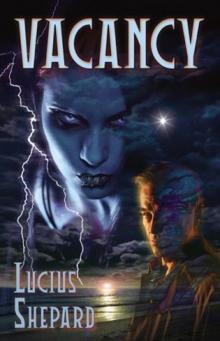 Vacancy & Ariel
Vacancy & Ariel The Dragon Griaule
The Dragon Griaule The Ends of the Earth
The Ends of the Earth Two Trains Running
Two Trains Running Life of Buddha
Life of Buddha Louisiana Breakdown
Louisiana Breakdown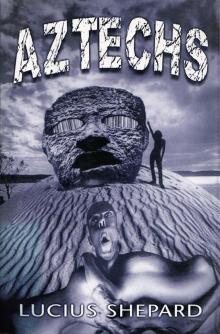 AZTECHS
AZTECHS Life During Wartime
Life During Wartime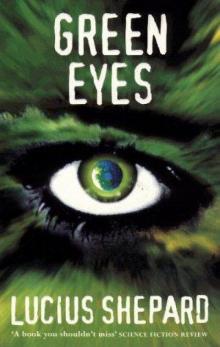 Green Eyes
Green Eyes Beautiful Blood
Beautiful Blood Stars Seen Through Stone
Stars Seen Through Stone Viator
Viator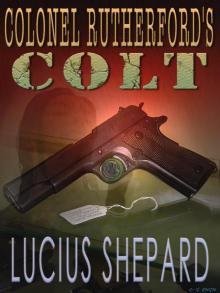 Colonel Rutherford's Colt
Colonel Rutherford's Colt Dagger Key and Other Stories
Dagger Key and Other Stories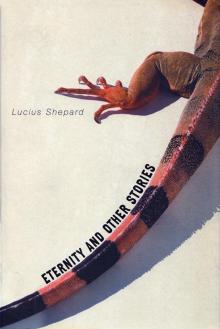 Eternity and Other Stories
Eternity and Other Stories Softspoken
Softspoken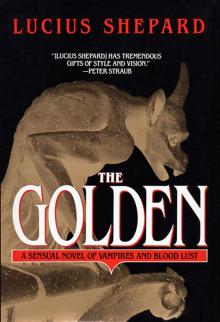 The Golden
The Golden